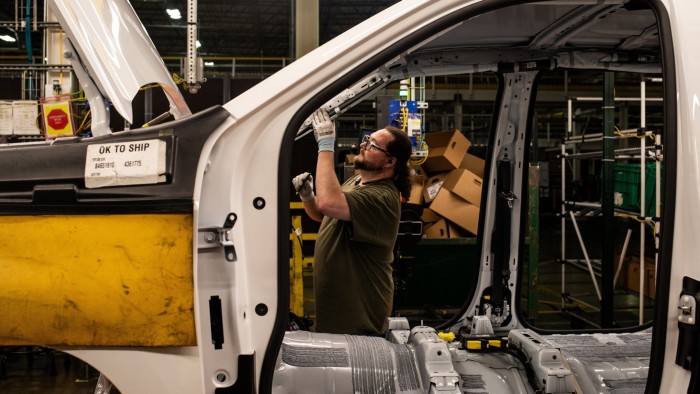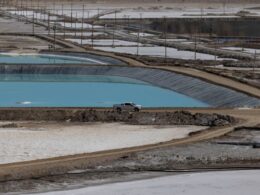Unlock the Editor’s Digest for free
Roula Khalaf, Editor of the FT, selects her favourite stories in this weekly newsletter.
As Donald Trump’s tariff war unleashes chaos, political leaders in Asia and Europe have declared that the era of post-cold war prosperity from global trade may finally be coming to a close.
“We are in the midst of a messy transition globally. To what, nobody can tell,” Singaporean prime minister Lawrence Wong said earlier this month, adding that nations were “turning inward” and “prioritising their own narrow interests”. Polish Prime Minister Donald Tusk echoed the warning in the same week, saying “the era of naive globalisation” was coming to an end.
For businesses, rising protectionism and decoupling between the US and China have thrown complex global supply chains into disarray, putting pressure on industries from technology and consumer goods to automotive and shipping.
Industry executives who previously have been reluctant to criticise the Trump administration are starting to speak out as behind-the-scenes tariff negotiations start to come to a crunch and fears begin to crystallise that their warnings will not force the US president to retreat from a full-blown trade war.
More on The Future of Global Trade
“With the current path of painful tariffs and overly rigid regulations, the American and European car industries are being put at risk,” John Elkann, chair of Stellantis, which makes the Chrysler and Jeep brands, told shareholders at the group’s annual meeting this month. “That would be a tragedy as car manufacturing is a source of jobs, innovation and strong communities.”
Another senior automotive executive says the industry would face a downturn as severe as the chip crisis following the Covid-19 pandemic or the global financial crisis of 2008 if Trump stays on his current course. “I think that vicious cycle starts to play out more this summer.”
Ngozi Okonjo-Iweala, director-general of the World Trade Organization, has warned that the division of the global economy into two blocs could cause long-term decline in global real GDP of nearly 7 per cent.
“The negative macroeconomic effects will not be confined to the United States and China,” Okonjo-Iweala said in the statement earlier this month. “Of particular concern is the potential fragmentation of global trade along geopolitical lines.”
The car industry has been one of the biggest beneficiaries of postwar globalisation, with manufacturers including Volkswagen, Toyota, Hyundai and General Motors capitalising on the growth of the world’s two largest markets. The industry could therefore be one of the biggest victims of economic warfare between the US and China.
Trump has imposed a 25 per cent tariff on imports of all foreign-made cars, with some exemptions for Mexico and Canada, while the same level of tariffs will hit a majority of imported car parts from May 3.
The US president has recently suggested that there could be “help” for the industry but if the tariff policy is not adjusted drastically, executives say every single carmaker and supplier will be hit multiple times by the additional levies.
“We are a big believer in free trade because this is beneficial for everybody,” says Michael Lohscheller, chief executive of Polestar, the Swedish electric vehicle manufacturer. “The car industry is an industry where you invest big money so we want to have certain stability.”
Companies are already rejigging supply chains to respond to the higher tariffs, with Honda moving the entire production of its five-door Civic hybrid vehicles from Japan to the US, while Sweden’s Volvo Cars is considering adding production of another model to its US plant in South Carolina.

Still, executives say unwinding the deeply interconnected supply chains will be difficult and risky, especially during a period of deep policy uncertainty.
Building a new plant in the US would also take years and costs are rising — especially since automation equipment, parts and metals used for many of these factories are sourced from outside of the US.
“If you’re a smart executive right now, potentially you announce that you’re going to make an investment [in the US],” says Panos Kouvelis, a supply chain management expert at Washington University in St Louis. “And then three years down the road, you cancel it.”
Whatever the outcome of the current trade conflict, industries will need to find a way to diversify supply chains that are overly dependent on China, some executives say, especially in raw materials that are critical in areas such as the steel, semiconductor and automotive industries. Building capabilities for those alternative sources will ultimately require co-operation across regions, including the EU, the US and China.
“We shouldn’t blame the Chinese, but we shouldn’t look the other way,” says Stefan Borgas, chief executive of London-listed RHI Magnesita, the world’s biggest producer of industrial ceramics. “How can we secure the global industries in a way that there are two sources of resources for every critical part. We need to do this together.”
Additional reporting by Harry Dempsey in Tokyo
Source link









